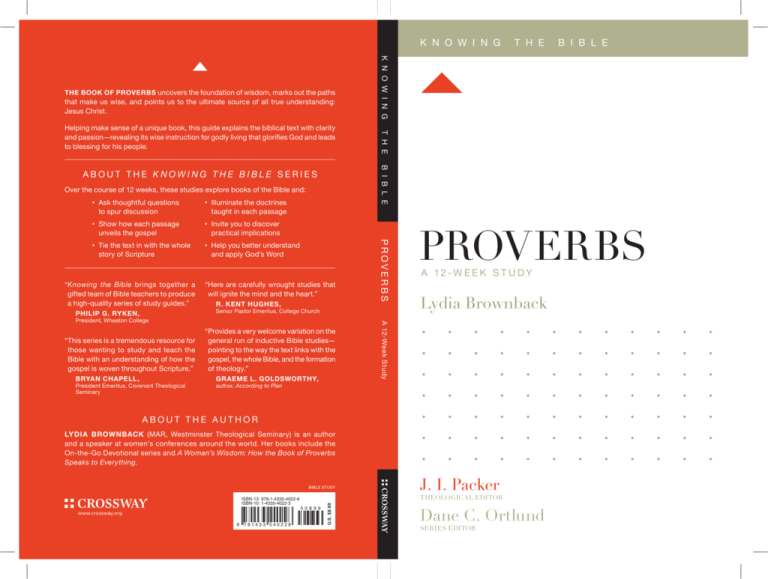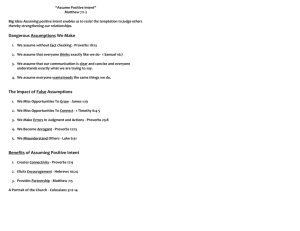
K N O W I N G
that make us wise, and points us to the ultimate source of all true understanding:
Jesus Christ.
B I B L E
ABOUT THE KNOWING THE BIBLE SERIES
Over the course of 12 weeks, these studies explore books of the Bible and:
Ask thoughtful questions
to spur discussion
•
Illuminate the doctrines
taught in each passage
•
Show how each passage
unveils the gospel
•
Invite you to discover
practical implications
•
Tie the text in with the whole
story of Scripture
•
elp you better understand
H
and apply God’s Word
“K nowing the Bible brings together a
gifted team of Bible teachers to produce
a high-quality series of study guides.”
“Here are carefully wrought studies that
will ignite the mind and the heart.”
R. KENT HUGHES,
Senior Pastor Emeritus, College Church
PHILIP G. RYKEN,
“This series is a tremendous resource for
those wanting to study and teach the
Bible with an understanding of how the
gospel is woven throughout Scripture.”
President Emeritus, Covenant Theological
Seminary
“Provides a very welcome variation on the
general run of inductive Bible studies—
pointing to the way the text links with the
gospel, the whole Bible, and the formation
of theology.”
GRAEME L. GOLDSWORTHY,
PROVERBS
A 12- W E E K S T U DY
Lydia Brownback
A 12-Week Study
President, Wheaton College
BRYAN CHAPELL,
PROVERBS
•
T H E
Helping make sense of a unique book, this guide explains the biblical text with clarity
and passion—revealing its wise instruction for godly living that glorifies God and leads
to blessing for his people.
author, According to Plan
ABOUT THE AUTHOR
LYDIA BROWNBACK (MAR, Westminster Theological Seminary) is an author
and a speaker at women’s conferences around the world. Her books include the
On-the-Go Devotional series and A Woman’s Wisdom: How the Book of Proverbs
Speaks to Everything.
BIBLE STUDY
9 781433 540226
J. I. Packer
THEOLOGICAL EDITOR
50899
U.S. $8.99
ISBN-13: 978-1-4335-4022-6
ISBN-10: 1-4335-4022-3
B I B L E
K N O W I N G
THE BOOK OF PROVERBS uncovers the foundation of wisdom, marks out the paths
T H E
Dane C. Ortlund
SERIES EDITOR
“This series is a tremendous resource for those wanting to study and teach the Bible with an
understanding of how the gospel is woven throughout Scripture. Here are gospel-minded
pastors and scholars doing gospel business from all the Scriptures. This is a biblical and theological feast preparing God’s people to apply the entire Bible to all of life with heart and mind
wholly committed to Christ’s priorities.”
BRYAN CHAPELL, Chancellor, Covenant Theological Seminary
“Mark Twain may have smiled when he wrote to a friend, ‘I didn’t have time to write you a
short letter, so I wrote you a long letter.’ But the truth of Twain’s remark remains serious and
universal, because well-reasoned, compact writing requires extra time and extra hard work.
And this is what we have in the Crossway Bible study series Knowing the Bible. The skilled
authors and notable editors provide the contours of each book of the Bible as well as the
grand theological themes that bind them together as one Book. Here, in a 12-week format,
are carefully wrought studies that will ignite the mind and the heart.”
R. KENT HUGHES, Senior Pastor Emeritus, College Church, Wheaton, Illinois
“Knowing the Bible brings together a gifted team of Bible teachers to produce a high-quality
series of study guides. The coordinated focus of these materials is unique: biblical content,
provocative questions, systematic theology, practical application, and the gospel story of
God’s grace presented all the way through Scripture.”
PHILIP G. RYKEN, President, Wheaton College
“These Knowing the Bible volumes provide a significant and very welcome variation on the
general run of inductive Bible studies. This series provides substantial instruction, as well as
teaching through the very questions that are asked. Knowing the Bible then goes even further
by showing how any given text links with the gospel, the whole Bible, and the formation of
theology. I heartily endorse this orientation of individual books to the whole Bible and the
gospel, and I applaud the demonstration that sound theology was not something invented
later by Christians, but is right there in the pages of Scripture.”
GRAEME L. GOLDSWORTHY, former lecturer, Moore Theological College; author,
According to Plan, Gospel and Kingdom, The Gospel in Revelation, and Gospel and Wisdom
“What a gift to earnest, Bible-loving, Bible-searching believers! The organization and
structure of the Bible study format presented through the Knowing the Bible series is so well
conceived. Students of the Word are led to understand the content of passages through perceptive, guided questions, and they are given rich insights and application all along the way
in the brief but illuminating sections that conclude each study. What potential growth in
depth and breadth of understanding these studies offer! One can only pray that vast numbers
of believers will discover more of God and the beauty of his Word through these rich studies.”
BRUCE A. WARE, Professor of Christian Theology, The Southern Baptist Theological
Seminary
K N O W I N G
T H E
B I B L E
J. I. Packer, Theological Editor
Dane C. Ortlund, Series Editor
Lane T. Dennis, Executive Editor
•
•
•
•
Genesis
Ruth, Esther
Psalms
Proverbs
Isaiah
Matthew
•
•
•
•
Mark
John
Acts
Romans
Philippians
James
•
•
•
•
J. I. PACKER is Board of Governors’ Professor of Theology at Regent College
(Vancouver, BC). Dr. Packer earned his DPhil at the University of Oxford. He is known
and loved worldwide as the author of the best-selling book Knowing God, as well as
many other titles on theology and the Christian life. He serves as the General Editor
of the ESV Bible and as the Theological Editor for the ESV Study Bible.
DANE C. ORTLUND is Senior Vice President for Bible Publishing at Crossway. He is
a graduate of Covenant Theological Seminary (MDiv, ThM) and Wheaton College
(BA, PhD). Dr. Ortlund has authored several books and scholarly articles in the areas
of Bible, theology, and Christian living.
LANE T. DENNIS is President of Crossway, a not-for-profit publishing ministry.
Dr. Dennis earned his PhD from Northwestern University. He is Chair of the ESV
Bible Translation Oversight Committee and Executive Editor of the ESV Study Bible.
PROVERBS
A 12-WEEK STUDY
Lydia Brownback
W H E AT O N , I L L I N O I S
Knowing the Bible: Proverbs, A 12-Week Study
Copyright © 2014 by Crossway
Published by C
rossway
1300 Crescent Street
Wheaton, Illinois 60187
All rights reserved. No part of this publication may be reproduced, stored in a
retrieval system, or transmitted in any form by any means, electronic, mechanical,
photocopy, recording, or otherwise, without the prior permission of the publisher,
except as provided for by USA copyright law.
Some content used in this study guide has been adapted from the ESV Study Bible
(Crossway), copyright 2008 by Crossway, pages 1129–1191. Used by permission.
All rights reserved.
Cover design: Simplicated Studio
First printing 2014
Printed in the United States of America
Scripture quotations are from the ESV® Bible (The Holy Bible, English Standard
Version®), copyright © 2001 by Crossway. 2011 Text Edition. Used by permission.
All rights reserved.
All emphases in Scripture quotations have been added by the author.
Trade paperback ISBN: 978-1-4335-4022-6
PDF ISBN: 978-1-4335-4023-3
Mobipocket ISBN: 978-1-4335-4024-0
EPub ISBN: 978-1-4335-4025-7
Crossway is a publishing ministry of Good News Publishers.
VP
15
14
25
13
24
12
23
11
22
10
21
9
20
8
19
7
6
18
5
17
4
16
3
15
2
14
1
Ta ble of Contents
Series Preface: J. I. Packer and Lane T. Dennis��������������������������������������������������������������6
Week 1:
Overview�������������������������������������������������������������������������������������������������������������7
Week 2:
The Beginning of Knowledge (1:1–7) ��������������������������������������������������� 11
Week 3:
A Father’s Invitation to Wisdom (1:8–7:27)����������������������������������������� 19
Week 4:
Wisdom Personified (8:1–36) ������������������������������������������������������������������� 27
Week 5:
Lady Wisdom and Lady Folly (9:1–18)��������������������������������������������������� 35
Week 6:
Proverbs of Solomon (10:1–16:33) ��������������������������������������������������������� 43
Week 7:
More Proverbs of Solomon (17:1–22:16) ��������������������������������������������� 51
Week 8:
Sayings of the Wise (22:17–24:34)����������������������������������������������������������� 59
Week 9:
Hezekiah’s Collection of Proverbs (25:1–29:27)��������������������������������� 67
Week 10: The Sayings of Agur and the Words of King Lemuel (30:1–31:9)����� 75
Week 11: An Alphabet of Womanly Excellence (31:10–31)������������������������������� 83
Week 12: Summary and Conclusion������������������������������������������������������������������������� 91
SERI ES
P REFACE
KNOWING THE BIBLE, as the series title indicates, was created to help readers
know and understand the meaning, the message, and the God of the Bible.
Each volume in the series consists of 12 units that progressively take the reader
through a clear, concise study of that book of the Bible. In this way, any given
volume can fruitfully be used in a 12-week format either in group study, such
as in a church-based context, or in individual study. Of course, these 12 studies
could be completed in fewer or more than 12 weeks, as convenient, depending
on the context in which they are used.
Each study unit gives an overview of the text at hand before digging into it
with a series of questions for reflection or discussion. The unit then concludes
by highlighting the gospel of grace in each passage (“Gospel Glimpses”),
identifying whole-Bible themes that occur in the passage (“Whole-Bible
Connections”), and pinpointing Christian doctrines that are affirmed in the
passage (“Theological Soundings”).
The final component to each unit is a section for reflecting on personal and
practical implications from the passage at hand. The layout provides space for
recording responses to the questions proposed, and we think readers need to
do this to get the full benefit of the exercise. The series also includes definitions
of key words. These definitions are indicated by a note number in the text and
are found at the end of each chapter.
Lastly, to help understand the Bible in this deeper way, we would urge the
reader to use the ESV Bible and the ESV Study Bible, which are available online
at www.esvbible.org. The Knowing the Bible series is also available online.
Additional 12-week studies covering each book of the Bible will be added as
they become available.
May the Lord greatly bless your study as you seek to know him through knowing his Word.
J. I. Packer and
Lane T. Dennis
6
Week 3: A Father’s
In vitation to Wisdom
Proverbs 1:8–7:27
The Place of the Passage
In the first eight chapters of Proverbs we find a series of appeals from a father
to his son, or sons, issuing a call to participate in the benefits of a life governed
by wisdom. A young man can choose either the path of the wise, which is characterized by the fear of the Lord, or the path of folly, which entails a rejection
of God’s ways. The paternal appeals in chapters 1–8 set out in poetic form the
themes that will appear in the proverbs proper in subsequent chapters.
The Big Picture
In keeping with the mandate of covenant life for God’s people, a father passes
on to the next generation the truth that the fear of the Lord is the path to
wisdom.
19
Week 3: A Father’s Invitation to Wisdom
Reflection and Discussion
Read through the entire text for this study, Proverbs 1:8–7:27. Then interact with
the following questions concerning this section of Proverbs and record your notes
on them. (For further background, see the ESV Study Bible, pages 1135–1147, or
visit www.esvbible.org.)
Read Proverbs 1:8–19. This first paternal appeal is a warning against those
who promise profit by taking sinful advantage of others. Such plots offer
companionship and immediate gain, yet they lead down a path that ends in
destruction. The force behind the temptation is greed, what the apostle Paul
calls “the love of money” (1 Tim. 6:10). The father concludes his warning by
pointing out that accumulating wealth through greed “takes away the life of
its possessors” (Prov. 1:19). Considering the passage as a whole, what might
this loss of life include?
Proverbs 2:1–22 is one long conditional sentence: “If . . . , then . . .” The protasis,
the if-clause, is set out in verses 1–4 and stresses the need to seek diligently
after wisdom. Those who do will understand the fear of the Lord and thereby
understand God’s ways (vv. 5–8). According to verses 6–8, what aspects of God’s
character will be discovered by those who pursue wisdom? In verses 9–22, how
does wisdom benefit those who find it?
The third paternal appeal, Proverbs 3:1–12, provides instruction on how to
act in wisdom and teaches that obeying the instruction results in blessing.
Verses 3–4 are a call to safeguard covenant life; verses 5–8 teach the necessity
20
Proverbs 1:8–7:27
of humility, which is firmly anchored here to trusting the Lord; verses 9–10
guide the hearer or reader to acknowledge in practical ways that everything
comes from God’s hand; and verses 11–12 are a call to submit to God’s discipline. Rewards of success, health, and prosperity are held forth for obeying the
instruction in this passage. Are these rewards always experienced in tangible
ways? How should we best understand them?
The fourth appeal, Proverbs 3:21–35, encourages the one who finds wisdom
to guard it, knowing that the Lord sustains and secures the path of the righteous. At the center of the appeal is a series of commands (vv. 27–31) prohibiting actions that violate love of neighbor and incur the Lord’s displeasure. The
father expresses how God views the wicked: “Toward the scorners he is scornful” (v. 34). Read James 4:6; 1 Peter 5:5–6; and Psalm 138:6. Taken together with
Proverbs 3:34, what do these passages reveal about the folly of pride?
The focus of the fifth appeal is the importance of passing down to each generation the nature of covenant life. In Proverbs 4:1–9 the father, after giving an opening encouragement, cites the appeal that his own father made to
him. The son is therefore hearing wisdom garnered from the preceding two
generations. The boy’s grandmother is also mentioned in the passage. How
do Deuteronomy 6:4–8; Psalm 78:1–8; Matthew 19:13; and Ephesians 6:1–4
deepen your understanding of the significance of the theme of this passage?
21
Week 3: A Father’s Invitation to Wisdom
The sixth paternal appeal comes in Proverbs 4:10–19, and it asserts that everyone must make a choice between the way of wisdom and the way of folly. Trace
the course of each path in verses 10–19 to its inevitable conclusion. Contrast the
images the teacher uses to illuminate the two paths. What terms appear more
than once in the passage, and what specifically does this repetition emphasize?
Proverbs 4:20–27 holds the seventh appeal. The emphasis here is on safeguarding oneself on the path of wisdom. Staying on course involves disciplining
the heart (v. 23), the tongue (v. 24), the eyes (v. 25), and the feet (vv. 26–27).
Read Mark 7:21–23 and Luke 6:45. How do these two Gospel texts show that
Proverbs 4:23 is the key verse in this paternal appeal?
The eighth appeal, all of Proverbs 5, concerns matters of sexual morality. The
message of the passage is given by illustrating the allure of an immoral woman
and the consequences of following her into sin. The wise person is able to adapt
the counsel inherent in the illustration wherever applicable to his or her life.
What traits do you see in verses 3–6 that are blatantly antithetical to the traits
of wisdom put forth in Proverbs thus far? What antidote to temptation is given
in verses 15–20?
Proverbs 6:1–19 gives instruction for dealing wisely with people who bear
responsibility for their plight. We find a warning against putting up security
for another (vv. 1–5), an exhortation of the sluggard to follow the example of
the ant lest he come to ruin (vv. 6–11), and a description of the sort of characteristics that the Lord hates (vv. 12–19). This final section begins with a
22
Proverbs 1:8–7:27
numeric literary device, “There are six things that the Lord hates, seven that
are an abomination to him” (v. 16), which indicates that the list is representative rather than exhaustive. What shared aspects are found in the sinful traits
listed in verses 17–19, and what negative impact is shared by all?
The ninth and tenth paternal appeals continue the theme of sexual ethics and
focus more specifically on adultery. In the ninth appeal, Proverbs 6:20–35,
what particular consequence of adultery does the author emphasize? The
tenth appeal, all of chapter 7, begins with a warning to keep away from an
adulterous woman and then outlines what happens to someone who refuses
to resist temptation. What, according to the teacher, is the way of wisdom in
avoiding such a downfall? Read 2 Samuel 11. How might this sad incident in
Israel’s history have shaped the book of Proverbs?
Read through the following three sections on Gospel Glimpses, Whole-Bible
Connections, and Theological Soundings. Then take time to consider the Personal
Implications these sections may have for you.
Gospel Glimpses
THE GIFT OF WISDOM. “For the Lord gives wisdom” (Prov. 2:6a). The opening
chapters of Proverbs issue a clear invitation to the reader to pursue, seek after,
and obtain wisdom. In fact, it makes clear that seeking wisdom is the essence
of wisdom! Yet no matter how diligently we apply ourselves, we are incapable
of laying hold of the wisdom we so desperately need, and because that is true,
God gives it to us. The gift of wisdom is held out to us by James in the New
Testament as well: “If any of you lacks wisdom, let him ask God, who gives
generously to all without reproach, and it will be given him” (James 1:5).
23
Week 3: A Father’s Invitation to Wisdom
DISCIPLINE. God’s discipline of his people is linked to his love for them, which
is why a father instructs his son, “Do not despise the Lord’s discipline or be
weary of his reproof, for the Lord reproves him whom he loves, as a father the
son in whom he delights” (Prov. 3:11–12). This passage is cited in Hebrews 12,
where it is introduced with a question: “Have you forgotten the exhortation
that addresses you as sons?” (v. 5). Discipline from the Lord’s hand is a sign of
his favor and our status in his covenant family.
STEADFAST LOVE AND FAITHFULNESS. A young man is instructed, “Let not
steadfast love and faithfulness forsake you” (Prov. 3:3a). This is covenant language, used here as an encouragement to live faithfully with and among God’s
covenant people. The verse reflects God’s self-revelation of his character to
Moses: “The Lord, the Lord, a God merciful and gracious, slow to anger, and
abounding in steadfast love and faithfulness” (Ex. 34:6). The fullest picture of
God’s steadfast love was demonstrated in the life and death of his Son, Jesus.
Whole-Bible Connections
TWO PATHS. “The path of the righteous is like the light of dawn, which
shines brighter and brighter. . . . The way of the wicked is like deep darkness”
(Prov. 4:18–19). The doctrine of the two ways, or paths, is found throughout
Scripture, and it is the underlying message of Proverbs. There is the way of
wisdom and the way of folly, the path of covenant life and relationship with
God and the path of idolatry.1 The two paths and their inevitable outcomes are
portrayed in Psalm 1; the prophet Jeremiah called the good way the “ancient”
path (Jer. 6:16). Later, Jesus made known that he himself is the good way, the
path to eternal life, and he described it as “narrow” (Matt. 7:14). Following that,
the apostle Paul sets out the opposing ways of law and grace: “Now we are
released from the law, having died to that which held us captive, so that we
serve in the new way of the Spirit and not in the old way of the written code”
(Rom. 7:6). Ultimately, wisdom teaches us that through our submitting to God
and trusting him, he will guide our feet along the right path (Prov. 3:5–6).
ADULTERY. Much space in Proverbs is devoted to the topic of sexual sin, most
specifically adultery. The covenant of marriage was instituted by God at creation (Gen. 2:24–25) and serves as an earthly representative of God’s covenant
relationship with his people, most fully in believers’ union with Christ. Given
the sacred nature of marriage, the law prescribed death as the penalty for adultery (Lev. 20:10). Adultery is closely linked to idolatry in Scripture; to worship
idols is to commit spiritual adultery against God and forsake one’s covenant
relationship with him (Jer. 3:9; 5:7; Ezek. 23:37; Hos. 4:13; Rev. 2:20–22).
THE HEART. “Keep your heart with all vigilance, for from it flow the springs
of life” (Prov. 4:23). “Heart” in Proverbs regularly refers to the center of one’s
24
Proverbs 1:8–7:27
inner life and orientation to God, from which persons do all their thinking,
feeling, and choosing. Jesus echoed Moses when he told a scribe that the first
and greatest commandment is to love God with all one’s heart (Mark 12:29–30;
see Deut. 6:4–5), and there are many references, most especially in the Psalms,
to offering to God wholehearted love. To be less than fully committed to the
Lord is, according to James, to be double-minded: “Draw near to God, and he
will draw near to you. Cleanse your hands, you sinners, and purify your hearts,
you double-minded” (James 4:8).
Theological Soundings
JUDGMENT.2 “They shall eat the fruit of their way, and have their fill of their
own devices” (Prov. 1:31). The ultimate judgment for rejecting God and his
ways and pursuing an unrepentant course of sin is to be given over to the sin
itself. God eventually lifts his gracious restraints. We find a fuller picture of
this hardening process in Romans 1, where Paul outlines the downward spiral
of those “who by their unrighteousness suppress the truth” (Rom. 1:18). Paul
repeatedly declares that God gives them over in increasing degrees to a debased
mind and the practice of evil (vv. 24–32).
ELECTION.3 “For the Lord gives wisdom” (Prov. 2:6). Proverbs invites us to share
in the blessings of wisdom, which is to enjoy fellowship with God and his people,
yet apart from God’s intervention, we remain fools, scorners, scoffers, and haters
of knowledge. That is why, for all the many appeals in Proverbs to seek after and
acquire wisdom, ultimately we receive it only because God gives it to us. The
same holds true of eternal salvation, as Paul writes: “By grace you have been saved
through faith. And this is not your own doing; it is the gift of God” (Eph. 2:8).
Personal Implications
Take time to reflect on the implications of Proverbs 1:8–7:27 for your own life
today. Consider what you have learned that might lead you to praise God, repent
of sin, and trust in his gracious promises. Make notes below on the personal implications for your walk with the Lord of the (1) Gospel Glimpses, (2) Whole-Bible
Connections, (3) Theological Soundings, and (4) this passage as a whole.
1. Gospel Glimpses
25
Week 3: A Father’s Invitation to Wisdom
2. Whole-Bible Connections
3. Theological Soundings
4. Proverbs 1:8–7:27
As You Finish This Unit . . .
Take a moment now to ask for the Lord’s blessing and help as you continue in this
study of Proverbs. And take a moment also to look back through this unit of study
and reflect on a few key things that the Lord may be teaching you.
Definitions
1
Idolatry – In the Bible, usually refers to the worship of a physical object. Paul’s comments in Colossians 3:5, however, suggest that idolatry can include covetousness, since it is essentially equivalent to worshiping material things.
2
J udgment – Any assessment of something or someone, especially moral assessment. The Bible also speaks of
a final day of judgment when Christ returns, when all those who have refused to repent will be judged (Rev.
20:12–15).
3
E lection – In theology, God’s sovereign choice of people for redemption and eternal life. Related to the doctrine
of predestination.
26
K N O W I N G
that make us wise, and points us to the ultimate source of all true understanding:
Jesus Christ.
Over the course of 12 weeks, these studies explore books of the Bible and:
Ask thoughtful questions
to spur discussion
•
Illuminate the doctrines
taught in each passage
•
Show how each passage
unveils the gospel
•
Invite you to discover
practical implications
•
Tie the text in with the whole
story of Scripture
•
elp you better understand
H
and apply God’s Word
“K nowing the Bible brings together a
gifted team of Bible teachers to produce
a high-quality series of study guides.”
“Here are carefully wrought studies that
will ignite the mind and the heart.”
R. KENT HUGHES,
Senior Pastor Emeritus, College Church
PHILIP G. RYKEN,
“This series is a tremendous resource for
those wanting to study and teach the
Bible with an understanding of how the
gospel is woven throughout Scripture.”
President Emeritus, Covenant Theological
Seminary
“Provides a very welcome variation on the
general run of inductive Bible studies—
pointing to the way the text links with the
gospel, the whole Bible, and the formation
of theology.”
GRAEME L. GOLDSWORTHY,
PROVERBS
A 12- W E E K S T U DY
Lydia Brownback
A 12-Week Study
President, Wheaton College
BRYAN CHAPELL,
PROVERBS
•
B I B L E
ABOUT THE KNOWING THE BIBLE SERIES
T H E
Helping make sense of a unique book, this guide explains the biblical text with clarity
and passion—revealing its wise instruction for godly living that glorifies God and leads
to blessing for his people.
author, According to Plan
ABOUT THE AUTHOR
LYDIA BROWNBACK (MAR, Westminster Theological Seminary) is an author
and a speaker at women’s conferences around the world. Her books include the
On-the-Go Devotional series and A Woman’s Wisdom: How the Book of Proverbs
Speaks to Everything.
BIBLE STUDY
B I B L E
K N O W I N G
THE BOOK OF PROVERBS uncovers the foundation of wisdom, marks out the paths
T H E
J. I. Packer
THEOLOGICAL EDITOR
Dane C. Ortlund
SERIES EDITOR










